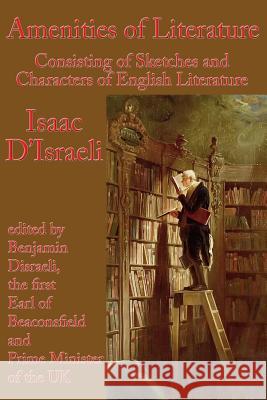Amenities of Literature: Consisting of Sketches and Characters of English Literature » książka
Amenities of Literature: Consisting of Sketches and Characters of English Literature
ISBN-13: 9781515400356 / Angielski / Miękka / 2016 / 512 str.
Isaac D'Israeli's Amenities of Literature was published in 1841, when the author was seventy-five years old. The title was adopted to connect it with two preceding volumes, Curiosities of Literature and Miscellanies of Literature. As the author writes in the preface, this book was intended to form a portion of a much larger work that was never completed. "A history of our vernacular literature has occupied my studies for many years. It was my design, not to furnish an arid narrative of books or of authors, but following the steps of the human mind through the wide track of time, to trace from their beginning the rise, progress, and decline of public opinions.... In the progress of these researches many topics presented themselves, some of which from their novelty and curiosity courted investigation. Literary history, in this enlarged circuit, becomes not merely a philological history of critical erudition, but ascends into a philosophy of books." In the midst of his studies for this book, D'Israeli went blind, and finished this book with his daughter's assistance. However, this limited the work to just this one book (first published in two volumes, but presented here complete in one). The first volume consists of 38 chapters on subjects connected with early English life and literature, such as The Druidical Institution; Caedmon and Milton; Dialects; Early Libraries; The Ship of Fools; and Roger Ascham. The second volume, possessing less unity of design, has 32 chapters on subjects strange, familiar, and quaint, including Rhyming Dictionaries, Allegories, and the Rosicrucian Fludd, as well as Sir Philip Sidney, Spenser, Hooker, Drayton, and a dissertation on Pamphlets. The book as a whole is a pleasant guide into the half-hidden by-paths of English literary history. It is a repository of much curious book-gossip and of authors' lore. Isaac D'Israeli (1766-1848) was an assimilated first generation English Jew. His father, a merchant, had immigrated from Italy 18 years before Isaac's birth. He was a writer and scholar, and became one of the noted bibliophiles of his time. He wrote several English adaptations of traditional tales from the Middle East, some historical biographies, and a number of poems. In addition to Amenities of Literature, his most popular work was a collection of essays entitled Curiosities of Literature, which was a collection of anecdotes about historical persons and events, unusual books, and the habits of book-collectors. His book The Life and Reign of Charles I (1828) earned him a Doctor of Civil Law (DCL) from Oxford University. His son, Benjamin Disraeli (1804-81), who edited this book, was Prime Minister of the United Kingdom in 1868 and again from 1874 to 1880.
Isaac DIsraelis Amenities of Literature was published in 1841, when the author was seventy-five years old. The title was adopted to connect it with two preceding volumes, Curiosities of Literature and Miscellanies of Literature. As the author writes in the preface, this book was intended to form a portion of a much larger work that was never completed. "A history of our vernacular literature has occupied my studies for many years. It was my design, not to furnish an arid narrative of books or of authors, but following the steps of the human mind through the wide track of time, to trace from their beginning the rise, progress, and decline of public opinions.… In the progress of these researches many topics presented themselves, some of which from their novelty and curiosity courted investigation. Literary history, in this enlarged circuit, becomes not merely a philological history of critical erudition, but ascends into a philosophy of books." In the midst of his studies for this book, DIsraeli went blind, and finished this book with his daughters assistance. However, this limited the work to just this one book (first published in two volumes, but presented here complete in one).The first volume consists of 38 chapters on subjects connected with early English life and literature, such as The Druidical Institution; Cædmon and Milton; Dialects; Early Libraries; The Ship of Fools; and Roger Ascham. The second volume, possessing less unity of design, has 32 chapters on subjects strange, familiar, and quaint, including Rhyming Dictionaries, Allegories, and the Rosicrucian Fludd, as well as Sir Philip Sidney, Spenser, Hooker, Drayton, and a dissertation on Pamphlets. The book as a whole is a pleasant guide into the half-hidden by-paths of English literary history. It is a repository of much curious book-gossip and of authors lore.Isaac DIsraeli (1766-1848) was an assimilated first generation English Jew. His father, a merchant, had immigrated from Italy 18 years before Isaacs birth. He was a writer and scholar, and became one of the noted bibliophiles of his time. He wrote several English adaptations of traditional tales from the Middle East, some historical biographies, and a number of poems. In addition to Amenities of Literature, his most popular work was a collection of essays entitled Curiosities of Literature, which was a collection of anecdotes about historical persons and events, unusual books, and the habits of book-collectors. His book The Life and Reign of Charles I (1828) earned him a Doctor of Civil Law (DCL) from Oxford University. His son, Benjamin Disraeli (1804-81), who edited this book, was Prime Minister of the United Kingdom in 1868 and again from 1874 to 1880.











